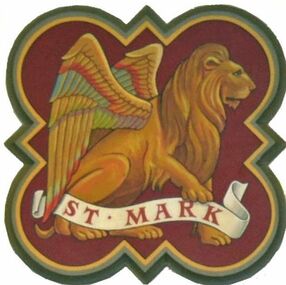During autumn this year, Fr. Gabriel Bullock of St. Nicholas Antiochian Orthodox Church is leading us in a study of the Gospel of Mark. All that is needed for this study is your Bible. For background in this study, I am reading The Writings of the New Testament by Luke Timothy Johnson, The Anchor-Yale Bible Commentary on Mark edited by Joel Marcus, and The Genesis of Secrecy by Frank Kermode. This is a ten-week study.
(Autumn 2015)
The Gospel of Mark – Introduction, pt.1
We will read through Mark not as a mere recitation of facts, but as a work of literature. Therefore, we will focus on the organization of the Gospel and the words Mark uses in telling us who Jesus is (Christology), who the church is (Ecclesiology), and who God is (Theology).
The Gospel of Mark – Introduction, pt.2
The good news of Caesar Augustus was peace and prosperity in the empire as brought about and enforced by the Roman legions. Mark tells us that the good news of Jesus is not only something different than that offered by the Emperor but rivals and seeks to replace him.
The Gospel of Mark – Chapter 1
We see this cosmic battle begin in Mark 1 in the desert temptation and particularly with the demonic in the synagogue. This cosmic battle therefore is being waged not only in the spiritual realm but on earth between Jesus and his followers and the secular and religious powers of the world.
The Gospel of Mark – Chapters 2-3
Throughout Mark, we will see that the insider and authoritative person – scribes, Pharisees, and even sometimes the disciples – are the ones that oppose Jesus the strongest for they seek comprehension and power whereas Jesus brings mystery and suffering and death (in this world).
The Gospel of Mark – Chapter 3
On the other hand, we see Jesus’ conflict with the religious authorities – Pharisees, scribes, and teachers of the law – whose very obedience to the black-letter words of the scripture has hardened their hearts to its spirit of doing good for those in need. As a result, these religious authorities’ zeal for strict obedience to the legal requirements of scripture causes them to ally with the secular authority of King Herod in order to…
The Gospel of Mark – Chapter 4, pt.1
Kermonde sees the parables as enigmatic riddles, more in the nature of the Riddle of the Sphinx than a story whose teaching is self-evident. He writes that parables operate with “radiant obscurity” in their simultaneous proclamation of the truth like a herald and concealment of the truth as an oracle.
The Gospel of Mark – Chapter 4, pt.2
The messianic secret isn’t simply a hidden fact but becomes the lens through which everything must be seen and interpreted. Those who do not know the secret simply cannot perceive and understand what is occurring.
The Gospel of Mark – Chapter 5
Mark 5 has three stories of healing – moving from unclean to clean – and restoration to society – spiritually, physically, and eternally.
The Gospel of Mark – Chapter 6
In chapter 6, Mark interrupts the story of the sending of the disciples with the story of the execution of John the Baptist. Why? What connection do these two stories have with each other and with Mark’s intended audience?
The Gospel of Mark – Chapter 7
Jesus teaches that even the black-letter rules of the Law, specifically those concerning external cleanliness such as keeping kosher (Lev. 11:1-47), must give way to the underlying purpose of the Law which is a cleanliness of heart.
The Gospel of Mark – Chapter 8
This conversation between Peter and Jesus is one of the great transitions in Mark’s Gospel. Until this time, Jesus has been an itinerant preacher and healer in northern Galilee but his ultimate end of dying on the cross in Jerusalem is unknown.
The Gospel of Mark – Chapters 8:22-10:52, pt.1
This section begins with the healing of the blind man of Bethsaida who (like the disciples) only sees dimly and partially at first.
The Gospel of Mark – Chapters 8:22-10:52, pt.2
The Transfiguration is the heart of this transition section. Here we have Jesus’ metamorphasis from a Galilean itinerant preacher/healer into the fullness of his purpose and being as the Messianic Son of God to be crucified in Jerusalem.
The Gospel of Mark – Chapters 8:22-10:52, pt.3
Within these readings, Jesus will twice use the example of a child to instruct his disciples in the humility and utter dependence that he expects of them and us.
The Gospel of Mark – Chapters 8:22-10:52, pt.4
The section ends with the healing of blind Bartemaeus who refers to Jesus as both “Son of David” and “Highest Master.” With these two titles, Jesus prepars to enter Jerusalem.
The Gospel of Mark – Chapters 11-13, pt.1
Throughout the readings for this week, Mark relies heavily on the Psalms to tell us who Jesus is.
The Gospel of Mark – Chapters 11-13, pt.2
Mark 13 is known as the “Little Apocalypse.” In this section , Mark draws heavily on the language and image from the Book of Daniel.
The Gospel of Mark – Chapters 14-16
Mark’s presentation of the Last Supper brings to fruition the eschatology of the Hebrew Scriptures.
The Gospel of Mark – Chapters 14-16
Mark’s Gospel ends with command “to go to Galilee.” This command is not so much an ending, as a beginning, and it is directed not only at the characters in the story but, more specifically, to us the readers of the story.

